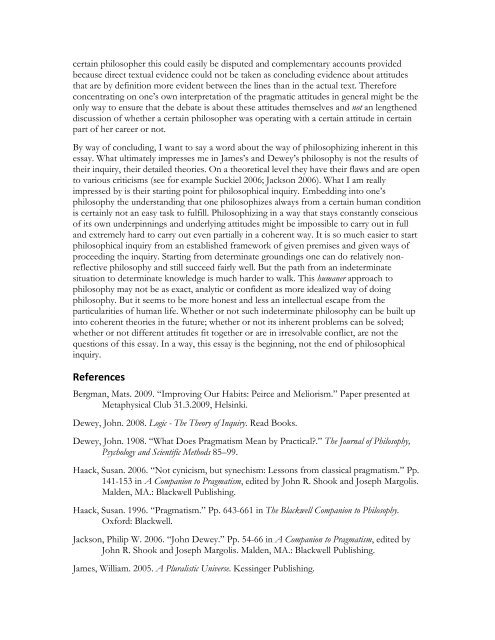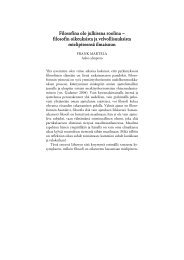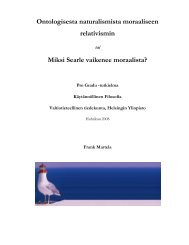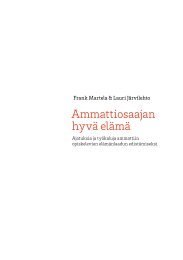Pragmatism as an attitude - Frank Martela
Pragmatism as an attitude - Frank Martela
Pragmatism as an attitude - Frank Martela
Create successful ePaper yourself
Turn your PDF publications into a flip-book with our unique Google optimized e-Paper software.
certain philosopher this could e<strong>as</strong>ily be disputed <strong>an</strong>d complementary accounts provided<br />
because direct textual evidence could not be taken <strong>as</strong> concluding evidence about <strong>attitude</strong>s<br />
that are by definition more evident between the lines th<strong>an</strong> in the actual text. Therefore<br />
concentrating on one’s own interpretation of the pragmatic <strong>attitude</strong>s in general might be the<br />
only way to ensure that the debate is about these <strong>attitude</strong>s themselves <strong>an</strong>d not <strong>an</strong> lengthened<br />
discussion of whether a certain philosopher w<strong>as</strong> operating with a certain <strong>attitude</strong> in certain<br />
part of her career or not.<br />
By way of concluding, I w<strong>an</strong>t to say a word about the way of philosophizing inherent in this<br />
essay. What ultimately impresses me in James’s <strong>an</strong>d Dewey’s philosophy is not the results of<br />
their inquiry, their detailed theories. On a theoretical level they have their flaws <strong>an</strong>d are open<br />
to various criticisms (see for example Suckiel 2006; Jackson 2006). What I am really<br />
impressed by is their starting point for philosophical inquiry. Embedding into one’s<br />
philosophy the underst<strong>an</strong>ding that one philosophizes always from a certain hum<strong>an</strong> condition<br />
is certainly not <strong>an</strong> e<strong>as</strong>y t<strong>as</strong>k to fulfill. Philosophizing in a way that stays const<strong>an</strong>tly conscious<br />
of its own underpinnings <strong>an</strong>d underlying <strong>attitude</strong>s might be impossible to carry out in full<br />
<strong>an</strong>d extremely hard to carry out even partially in a coherent way. It is so much e<strong>as</strong>ier to start<br />
philosophical inquiry from <strong>an</strong> established framework of given premises <strong>an</strong>d given ways of<br />
proceeding the inquiry. Starting from determinate groundings one c<strong>an</strong> do relatively nonreflective<br />
philosophy <strong>an</strong>d still succeed fairly well. But the path from <strong>an</strong> indeterminate<br />
situation to determinate knowledge is much harder to walk. This hum<strong>an</strong>er approach to<br />
philosophy may not be <strong>as</strong> exact, <strong>an</strong>alytic or confident <strong>as</strong> more idealized way of doing<br />
philosophy. But it seems to be more honest <strong>an</strong>d less <strong>an</strong> intellectual escape from the<br />
particularities of hum<strong>an</strong> life. Whether or not such indeterminate philosophy c<strong>an</strong> be built up<br />
into coherent theories in the future; whether or not its inherent problems c<strong>an</strong> be solved;<br />
whether or not different <strong>attitude</strong>s fit together or are in irresolvable conflict, are not the<br />
questions of this essay. In a way, this essay is the beginning, not the end of philosophical<br />
inquiry.<br />
References<br />
Bergm<strong>an</strong>, Mats. 2009. “Improving Our Habits: Peirce <strong>an</strong>d Meliorism.” Paper presented at<br />
Metaphysical Club 31.3.2009, Helsinki.<br />
Dewey, John. 2008. Logic - The Theory of Inquiry. Read Books.<br />
Dewey, John. 1908. “What Does <strong>Pragmatism</strong> Me<strong>an</strong> by Practical?.” The Journal of Philosophy,<br />
Psychology <strong>an</strong>d Scientific Methods 85–99.<br />
Haack, Sus<strong>an</strong>. 2006. “Not cynicism, but synechism: Lessons from cl<strong>as</strong>sical pragmatism.” Pp.<br />
141-153 in A Comp<strong>an</strong>ion to <strong>Pragmatism</strong>, edited by John R. Shook <strong>an</strong>d Joseph Margolis.<br />
Malden, MA.: Blackwell Publishing.<br />
Haack, Sus<strong>an</strong>. 1996. “<strong>Pragmatism</strong>.” Pp. 643-661 in The Blackwell Comp<strong>an</strong>ion to Philosophy.<br />
Oxford: Blackwell.<br />
Jackson, Philip W. 2006. “John Dewey.” Pp. 54-66 in A Comp<strong>an</strong>ion to <strong>Pragmatism</strong>, edited by<br />
John R. Shook <strong>an</strong>d Joseph Margolis. Malden, MA.: Blackwell Publishing.<br />
James, William. 2005. A Pluralistic Universe. Kessinger Publishing.






